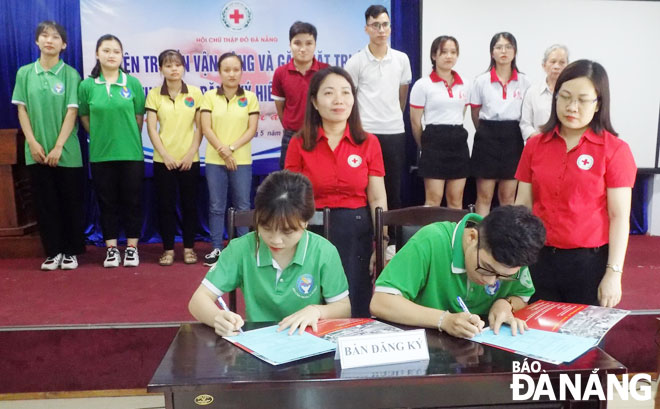Further spreading tissue and organ donation movements
Over the past decade, tissue and organ donation movements in Da Nang have spread encouragingly with a growing number of registrations. In light of many seriously ill patients who are at the end of the line for hope being still on the transplant waiting list, desperately - needed organ donation is essential to bring the life-giving, life-enhancing opportunity to them. It, therefore, is a must-do to further spread helps and spread this humanistic spirit in life in the coming time.
 |
| Da Nang young people register for organ donations after their death in May, 2020. Photo: XUAN DUNG |
That Pham Van Co, 18, a poor man residing in Hoa Quy Ward, Ngu Hanh Son District, Da Nang, was saved through a heart transplant is typical of noble deed.
His family suffered financial difficulties. Unfortunately, his father passed away whilst his older brother also died of a malignant heart disease, leaving him and his mother to depend on each other. Co’s critical health situation drove him and his mother to desperation for a long time.
Finally, the duo saw “the light at the end of the tunnel” with the hope of bringing the young man back to life as they received the heart from a brain-dead individual in the capital city of Ha Noi.
After that, Co's mother herself registered for donating tissues and organs after her death as a move to express her deep gratitude to the heart donator and her strong desire to save many lives.
However, not all patients are as lucky as Co. For the time being, the gap between demand for tissue and organ donations and their supplies is really huge. Many severely ill patients still on the long transplant waiting list or even die before they can find suitable tissues and organs. On the other hand, many normal individuals who either want to donate their organs after their death but do not know where and how to register or face criticism and objection from their families, relatives, and friends.
For example, Pham Thi Ngoc Thanh, a female resident in Thanh Khe Dong Ward, Thanh Khe District had a wish to donate organs upon her passing for a long time but did not know how and where to register. It was not until 2018 that she was instructed by the Da Nang Red Cross Society members on tissue and organ donation regulations at a training course for local preschool teachers.
“It’s normal to be hesitant about organ donation when you’re alive, but I am willing to do it when I die. I know that organs are very precious and hospitals are always in need of organs for patients,” said the organ donation registrant.
Organ donation involves transplanting healthy organs and tissues from a recently deceased person to someone in need.
The kidneys, heart, intestines, lungs, and several other organs from a single healthy donor can save eight to ten people, but healthcare institutions around the world are still desperate for organs to help their patients.
Organ donation is still considered taboo in Viet Nam, where traditional culture dictates that the deceased should be buried with a complete corpse.
According to Chairwoman of the municipal Red Cross Society Le Thi Nhu Hong, as of 2021, more than 200 people in Da Nang had registered as tissue and organ donors. All of them received confirmation cards from Viet Nam's National Coordination Centre for Organ Transplantation, which means that they have completed procedures to fulfill their humanity aspirations upon death.
In Da Nang, those who want to register for tissue and organ donations can send their registration forms in person or by post to the municipal Red Cross Society at 522 Ong Ich Khiem, Hai Chau District or make calls to 0236.3868.334 for free advice and consultancy. Registration procedures consist of an application form for tissue and organ donations, the hard copy of the ID cards and the 3x4 portrait photo.
Reporting by XUAN DUNG – Translating by A.T